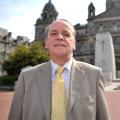
THE response of the newly reappointed First Minister to the results of the Scottish election is as depressing as it is predictable.
Following a mostly presidential campaign, emphasising Sturgeon’s handling of the pandemic, we are now told that there is a cast-iron mandate for another referendum and independence is around the corner.
At Full Council last Thursday, the SNP group were akin to religious zealots announcing the second coming. Independence was shoehorned into almost every single contribution and promoted as the cure all for every single problem. We face another five years of this triumphalist nonsense.
Like all nationalists, the SNP are desperately keen to promote a sense of exceptionalism, that Scots are somehow different from our neighbours with unique traditions and distinct, not to say superior, values. Scotland, they argue, could be so much better if we were not held back by Westminster. Westminster, of course, being no more than a euphemism for England.
In the two weeks since the election, this line of reasoning and myth making has been ratcheted up. We are told that the Scottish people have spoken and are being held against our will by the rule of law rather than democracy. This is a ridiculous argument as it ignores the fact that the rule of law is essential to any functioning democracy. In a democracy, laws can be changed but they cannot be ignored or dismissed simply because they are inconvenient.
Nationalists continuously argue that Scotland is almost unique among nations in that the people have always been sovereign. In doing so they hark back to a historical conceit concocted by George Buchanan almost 500 years ago to justify the overthrow of Queen Mary in 1567. It was trotted out again a century later to excuse the revolution against James VII. It was based on myth and invented history then, it remains a constitutional nonsense today.
Similarly, the SNP have jumped on the recent events in Kenmure Street to peddle not one but two myths. Firstly, that the Scots are more welcoming and tolerant than our near neighbours and secondly that, in an independent country, there would be no such thing as illegal immigrants. Survey after survey has proved that Scots are only marginally more liberal in their attitudes to immigration than the rest of the UK. Scotland, unfortunately, has its fair share of racists and sectarian bigots. That is an issue we have to tackle but it does not make us unique and certainly no better than our English and Welsh cousins.
An independent Scotland, like every country in the world, would have immigration laws. If, as the SNP hope, our neighbours agreed to a common travel area, those laws would have to be clear and effectively enforced. The alternative would be passport control at Berwick and Gretna. Instead of admitting this, our First Minister promulgates a falsehood that in a uniquely tolerant and progressive Scotland all such issues and difficulties will evaporate.
I fully expect the next several years to be entirely dominated by constitutional wrangling at the expense of using the powers and considerable resources of the Scottish Parliament to address the very real problems we all face.
These problems range from the strategic to the mundane. Independence is not required to improve the quality of our health service, it is already fully devolved. Freedom will not empty our bins or keep our libraries open.
There is no indisputable mandate for a referendum, still less is there any evidence that there is even a narrow majority for independence. Sadly, the SNP can never admit that because their myths are more important than any inconvenient reality.



Comments & Moderation
Readers’ comments: You are personally liable for the content of any comments you upload to this website, so please act responsibly. We do not pre-moderate or monitor readers’ comments appearing on our websites, but we do post-moderate in response to complaints we receive or otherwise when a potential problem comes to our attention. You can make a complaint by using the ‘report this post’ link . We may then apply our discretion under the user terms to amend or delete comments.
Post moderation is undertaken full-time 9am-6pm on weekdays, and on a part-time basis outwith those hours.
Read the rules hereLast Updated:
Report this comment Cancel